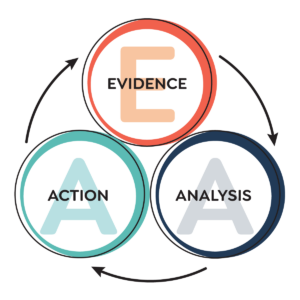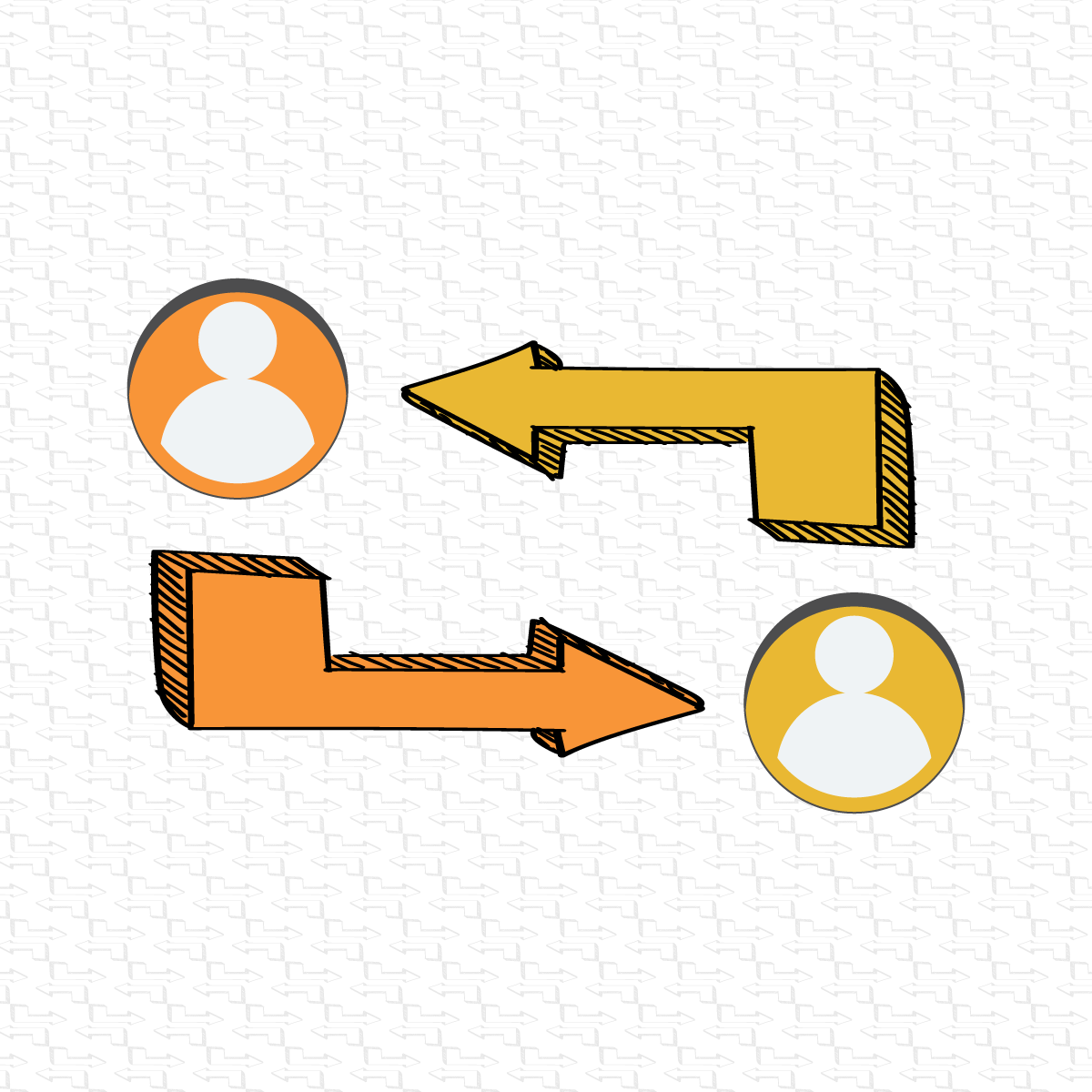The classroom buzzes with purposeful conversation. A whiteboard captures evidence of learning—student reflections, goal-setting charts, and notes highlighting strategies for self-questioning. In the corner, a sticky note reminds everyone: “How are we affirming our learners’ identities through reflection?”
Peer coaching within Impact Teams is not an isolated practice but one protocol educators use when engaging in broader Impact Team Collaborative Inquiry. Educators collaboratively explore instructional practices explicitly aimed at enhancing students’ metacognitive expertise and culturally affirming their learning experiences (Bloomberg & Pitchford, 2023).
Two teachers sit down, ready to review a recorded peer coaching segment. “Today, I focused on explicitly modeling self-questioning strategies for deeper comprehension,” one explains, opening the video on her tablet. “Let’s explore how clearly this connects to our broader inquiry into metacognition.”
This is peer coaching—a powerful, reflective practice embedded in the Impact Team Collaborative Inquiry Model where educators collaboratively refine their strategies to build learners’ metacognitive expertise. Peer coaching isn’t about evaluation—it’s about shared inquiry and collective growth.
What is Impact Team Collaborative Inquiry?
Impact Teams Collaborative Inquiry is a structured, learner-centered approach where students and teachers jointly engage in cycles of inquiry grounded in evidence, analysis, and action. Unlike traditional collaborative inquiry models primarily involving educators, Impact Teams explicitly position students as active partners, co-constructors of knowledge, and decision-makers alongside their teachers.
What sets Impact Teams Collaborative Inquiry apart is its commitment to student agency, equity, and democratic learning principles:
1. Shared Ownership of Learning:
Students actively participate in interpreting evidence, setting meaningful learning goals, and determining next steps, fostering deeper engagement and responsibility.
2. Democratic Participation:
Learners and teachers engage as equals in the inquiry process, sharing power and decision-making to co-create success criteria, goals, and improvement strategies.
3. Culturally Responsive and Asset-Based:
The model emphasizes leveraging students’ diverse strengths, identities, and cultural backgrounds to enrich inquiry, ensuring that learning experiences are inclusive and affirming.
4. Explicit Metacognition:
Students are explicitly taught to use reflective practices to plan, monitor, and evaluate their own and their peers’ learning, developing self-regulatory skills essential for lifelong learning.
5. Reciprocal Learning Relationships:
Teachers learn from students just as students learn from teachers, promoting mutual respect and a continuous cycle of feedback and growth.
6. Equity-Driven Decision-Making:
Inquiry cycles are guided by an equity lens, continually questioning whose voices are included, whose strengths are leveraged, and who benefits from learning decisions.
By positioning students alongside teachers as collaborative inquirers, Impact Teams foster not only academic achievement but also student empowerment, belonging, and a deeper, more democratic form of learning.
What Is Impact Team Peer Coaching?
Peer Coaching within Impact Teams involves educators collaboratively exploring brief instructional practices (5–10 minutes) that explicitly build students’ metacognitive skills such as self-questioning, monitoring comprehension, goal setting, and reflective practice. Teachers record these intentional, short segments to collectively analyze and refine.
Focus areas include:
- Modeling explicit self-questioning routines
- Teaching metacognitive strategies for monitoring understanding
- Co-constructing reflective prompts aligned with success criteria
- Affirming diverse learner identities through culturally responsive reflection practices
- Creating opportunities for students to teach and model metacognitive strategies for peers
According to John Hattie (2023), peer coaching has an effect size of 0.88, highlighting its profound impact on collective efficacy, student learning, and culturally affirming practices.
The EAA Framework in Peer Coaching
 EVIDENCE
EVIDENCE
What metacognitive practice are we modeling, and how does it connect to our collective inquiry? Impact Teams select a priority learning goal and co-create success criteria with students, anchoring their practice in culturally responsive principles. They identify a metacognitive strategy, such as reflective self-questioning, that explicitly enhances learner agency and honors students’ cultural identities and lived experiences.
A team member records a brief instructional segment modeling this strategy with clarity, ensuring it is relatable and accessible to diverse learners:
- “Does this strategy clearly affirm students’ cultural experiences?”
- “How are students invited to use their own language and experiences to navigate learning?”
ANALYSIS
What did we notice about the metacognitive strategy, and how might students respond culturally and cognitively? Teams collaboratively analyze the recorded segment, guided by empathy, curiosity, and an equity-driven lens:
- Was the metacognitive strategy explicitly named and modeled?
- Would students find personal relevance and cultural affirmation in this practice?
- Were multilingual learners’ experiences and cultural knowledge authentically included and validated?
- Was there enough room for student voice, reflection, and genuine inquiry?
Through analysis, teachers not only refine instructional clarity but also deepen their cultural responsiveness, affirming learners’ identities, experiences, and strengths.
ACTION
What’s our next best move to deepen students’ metacognitive expertise and cultural affirmation? Based on their reflective analysis, Impact Teams collaboratively plan responsive actions, such as:
- Re-teaching the strategy with enhanced cultural connections
- Providing students with greater choice in how they engage and apply metacognitive practices
- Incorporating peer-to-peer teaching opportunities, fostering student leadership and cultural pride
- Refining practices based on student reflections and feedback
These thoughtful, responsive actions continuously refine the learning environment, ensuring metacognition becomes not just a strategy but a deeply embedded, culturally affirming practice.
Tools to Support Peer Coaching Clarity
📹 Easy-to-Use Recording Tools:
- SWIVL Robot CX or OBSBOT Tiny 2: Automated tracking ensures clear instructional footage
- Rode Wireless ME or DJI Mic: Ensures crystal-clear audio for meaningful reflection
📄 Transcription and Annotation:
- Otter.ai and Descript: Transcribe and highlight culturally affirming language and strategic teacher moves
🔐 Privacy Considerations:
- Focus recordings primarily on teachers
- Use avatars, slides, or blur faces to maintain student privacy according to district guidelines
The Cultural Affirmation Connection
Zaretta Hammond emphasizes culturally responsive teaching as a practice that leverages students’ cultural knowledge and frames learning within their lived experiences (Hammond, 2015). Peer coaching explicitly aligns with these principles, grounding metacognitive strategies in cultural identity and collective agency.
When educators collaboratively refine their ability to model metacognitive practices, they create affirming classrooms where students:
- See their cultural identities honored and validated
- Develop the expertise to independently monitor and guide their learning
- Feel empowered to teach and lead their peers through culturally responsive metacognitive practices
Why This Matters: Metacognition as Empowerment
Peer coaching within Impact Teams isn’t merely about instructional improvement—it’s transformational. It honors students as active participants in their learning journey, acknowledging and affirming the cultural strengths each learner brings.
This practice not only cultivates metacognitive expertise but also advances agency, ensuring every student experiences learning as personally meaningful, culturally affirming, and deeply empowering.
Join our community committed to metacognitive clarity, collective efficacy, and transformative learning.
References
- Bloomberg, P. J., & Pitchford, B. (2023). Leading Impact Teams 2.0: Building a Culture of Efficacy and Agency. Mimi and Todd Press.
- Hammond, Z. (2015). Culturally Responsive Teaching and the Brain: Promoting Authentic Engagement and Rigor Among Culturally and Linguistically Diverse Students. Corwin Press.
- Hattie, J. (2023). Visible learning: The sequel: A synthesis of over 2,100 meta-analyses relating to achievement (1st ed.). Routledge. https://doi.org/10.4324/9781003380542



